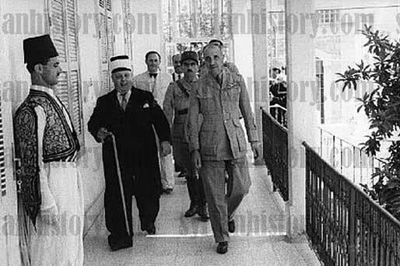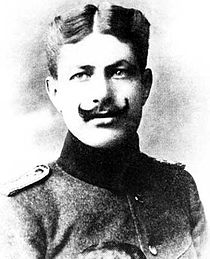History stutters: the new leader of the Syrian National Coalition, knighted by the West, is none other than the grand-son of one of the chief collaborators of the French occupation of Syria in the 20s. Formerly, the French colonial power resorted to religious leaders to teach submission to the people under its domination; today it relies on clerics to overthrow the secular regime of the Syrian Arab Republic.
Voltaire Network | Damascus (Syria) 

- A photograph taken in 1941, when Syria was still under the rule of French colonisers, has recently been circulating on social networking sites. In the worn black and white photograph, French General Georges Catroux is walking next to an elderly man with cunning eyes, Nur-Eddin al-Khatib
More than 70 years has passed and the grandson of this Nur-Eddin – Mouaz al-Khatib, a former preacher at the Umayyad mosque in Damascus and now a deserter and traitor – has been elected head of the "Qatar Coalition" which was created on 11 November at a meeting in Doha.
France has shown its gratitude to the third-generation collaborator al-Khatib, whose grandfather collaborated with the colonisers, for his faithful service. Namely the former colonial power has been the first to recognise the "Qatar Coalition" as a legitimate representative of the Syrian people. It is no surprise that the flag of the "opposition" – green, white and black with three stars – is the same as the flag from the time when Syria was under French mandate.
No sooner had Syria gained their freedom from Turkish rule than it immediately fell under the authority of the French in 1920, and the League of Nations gave France a mandate to control Syria. The French occupation army, headed by General Henri Gouraud, faced weak opposition from an armed Syrian army which had only just been formed and had nothing except rifles and machine guns, while the French had heavy artillery and aircraft. The conflict was one-sided.

- General Yusuf al-'Azma 1883-1920
Syrians and Druses rose up against the French occupiers in 1925 and even managed to liberate Damascus, but the French used their military strength to quash the uprising in 1927. The first shot of the uprising was fired on 7 June 1925 – a hero of the uprising, Hussein Murshid Radwan, wounded a French officer when he ordered a peaceful anti-French demonstration to be broken up.
Syria reveres its heroes and at the beginning of November, a magnificent monument was erected in the city of Suwayda in Hussein Murshid Radwan's honour. The sculptor, Fuad Naim, has paid particular attention to the hero's enormous sword which he has clenched in his mighty hand while challenging the French to battle.
In the centre of Damascus, meanwhile, there is a monument in honour of the Syrian Defence Minister Yusuf al-'Azma, a hero of the Battle of Maysalun Pass. Here we have genuine insurgents who fought for a free Syria. Now, however, the word "insurgent" has been completely defiled and is used today to refer to all sorts of rubbish recruited from all corners of the world who are high on drugs and murdering Syrians for money.
Until quite recently there was another monument in honour of al-'Azma which stood near the General Staff building. On 3 September this year, however, during an attack on the General Staff building, terrorists did not spare this monument. The vandals destroyed it. Can Syria's history really be that dear to these mercenaries? Or to the descendants of those who collaborated with the occupiers?
70 years has passed since France lost Syria as one of its colonies and was forced to recognise its independence. As recent events have shown, however, France just cannot ignore the colonial itch. It is doing everything to regain its sovereignty, although this time around, even if they conquer Syria, it would no longer be full sovereignty since France would have to share it with the USA, Turkey and other NATO partners. This is not troubling Hollande, however, who is backing every reprobate in Syria so long as the reprobate's position falls within the neocolonial plans of France's false socialists.
Back in the summer, French Prime Minister Jean-Marc Ayrault did not hesitate in saying that France was supplying Syrian fighters with communication equipment and other technology. He spoke as though the equipment was not for the purpose of killing. But it is all the same – is it really not going to aid the murderers?
And now the pseudo-socialist François Hollande has held a meeting with the old collaborator's grandson, Mouaz al-Khatib. After the meeting in Paris, the ambassador of the Syrian terrorists showed up – a certain Munzir Makhous who, together with his boss, was part of the delegation who visited the Élysée Palace and implored Hollande to supply the fighters with heavy artillery. Hollande promised to bring the matter up for discussion with the countries of the EU.
Earlier, Hollande had announced his intentions to create a "buffer" zone and a "no-fly" zone in Syria. At that time, however, his own foreign secretary threw cold water on his plans by announcing that such zones could only be created by a decision of the UN Security Council. And the position of the UN Security Council is clear – Russia and China will not give the go ahead for yet more ventures like the ones that have already ruined Libya. Knowing this, however, Hollande is trying to raise the morale of the terrorists operating within Syria. In order to do this, he is promising to create a "no-fly zone" – the relentless bombardment of Syria, in other words – and this is the one thing that the terrorists want. They are putting themselves at risk every time they place an improvised explosive device near a school, a hospital, a shopping centre, a mosque. Obviously they want to get support from the air so that they no longer have to risk their lives.
While the Syrian government and the Syrian people are placing monuments in honour of their heroes, the so-called "opposition members" are collaborating with the neocolonialists, making much of the colonialists' flags while killing soldiers and civilians. France recognises these murderers and terrorists as "legitimate representatives of the Syrian people". The only question is whether "representatives" like these are what the Syrian people really need.



No comments:
Post a Comment